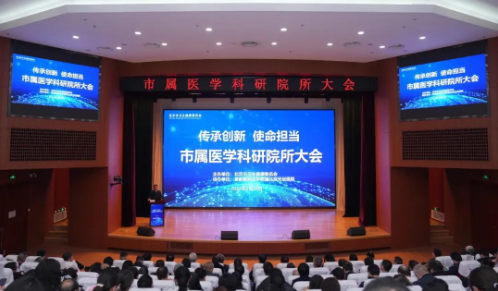On February 26, the first conference of municipal medical research institutes sponsored by the Beijing Municipal Health Commission was held at Beijing Tiantan Hospital affiliated to Capital Medical University. The conference was held to gather the scientific research resources of the medical research institutes in Beijing. The scientific research work of the institutes should be carried out firstly to drive the overall scientific research collaboration capabilities of 22 municipal hospitals, to improve the level of clinical diagnosis and treatment, serve the construction of international scientific and technological innovation centers, promote the transformation and implementation of medical scientific and technological innovation, and promote high-quality development of the biomedical health industry. Zhong Dongbo, Secretary of the Party Committee of the Beijing Municipal Health Commission, attended the meeting and delivered a speech. The conference was chaired by Li Ang, Deputy Director of the Beijing Municipal Health Commission.


The top 10 scientific and technological events in municipal hospitals and scientific research institutes in 2023 were released at the conference, which are as follows. 3 experts were elected as academicians of the Chinese Academy of Engineering. 6 were elected as Beijing Scholars. 9 research results with significant clinical and scientific value were published in top international journals. 3 national-level research platforms were newly approved. 8 scientific and technological achievement transformation contracts were completed, with worth more than 10 million yuan. 2 international multi-center clinical trials were led. The formulation of 1 international standard and rewriting of 2 international guidelines were led. 4 achievements were selected into the top 10 achievements of the Scientific Research Project of Capital Health Development in the past ten years, and 6 scientific and technological achievements won provincial and ministerial level science and technology awards.
The key tasks of municipal medical research institutes in 2024 were deployed at the conference, covering seven aspects and 18 specific key tasks, on strengthening planning guidance, strengthening demand orientation, improving clinical research capabilities, strengthening collaboration, improving support and guarantee systems, improving incentive mechanisms, and improving governance mechanisms.
Zhong Dongbo pointed out that municipal medical research institutes are the important component and force in the capital’s medical science and technology innovation system. Beijing has concentrated valuable clinical resources and patient resources for medical science and technology innovation. 18 institutions constitute the largest medical research institutes cluster in the country. We should make sufficient use of these resources to carry out medical scientific and technological innovation. In the next step, municipal hospitals and medical research institutes should adhere to the right direction, grasp key links, and make the contribution of Beijing in promoting medical science and technology innovation.
Relevant leaders from the relevant departments such as the Office of the Organization and Establishment Committee of the Beijing Municipal Party Committee, Beijing Municipal Development and Reform Commission, Beijing Municipal Education Commission, Zhongguancun Management Committee of Beijing Municipal Science and Technology Commission, Beijing Municipal Bureau of Economy and Information Technology, Beijing Municipal Finance Bureau, Beijing Municipal Human Resources and Social Security Bureau, Beijing Municipal Medical Insurance Bureau, and Beijing Municipal Food and Drug Administration, and 19 units including Tsinghua University, Peking University, China Union Medical College, Peking University School of Medicine, Capital Medical University, Beijing University of Traditional Chinese Medicine and other universities in Beijing, Beijing Institute of Life Sciences, Chinese Institute for Brain Research, and Changping National Laboratory, attended the conference.
